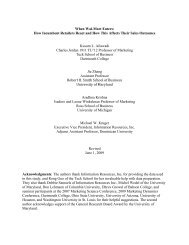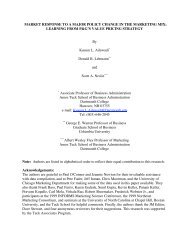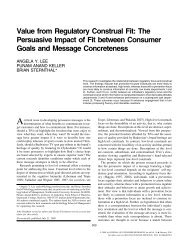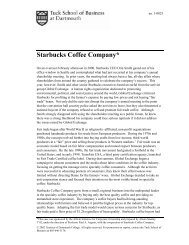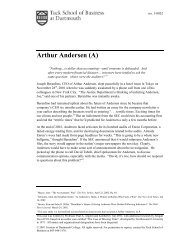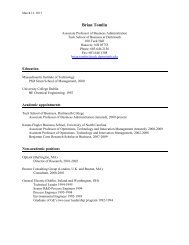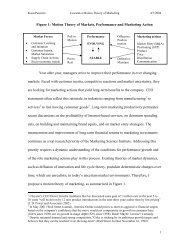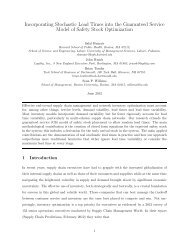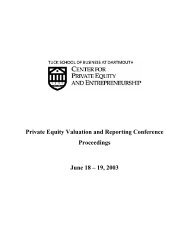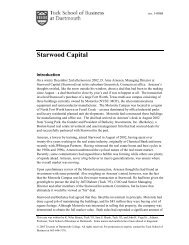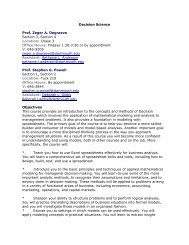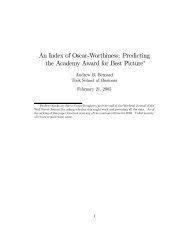tax notes international - Tuck School of Business - Dartmouth College
tax notes international - Tuck School of Business - Dartmouth College
tax notes international - Tuck School of Business - Dartmouth College
Create successful ePaper yourself
Turn your PDF publications into a flip-book with our unique Google optimized e-Paper software.
U.K. Tax Update<br />
Buddy, Can You Spare a Dime?<br />
by Trevor Johnson<br />
Trevor Johnson, FTII, AITI, ATT, is a chartered <strong>tax</strong> adviser and a past president <strong>of</strong> the Association <strong>of</strong><br />
Taxation Technicians. However, the views expressed are entirely his own.<br />
In the words <strong>of</strong> Private Frazer <strong>of</strong> the popular British<br />
sitcom Dad’s Army, ‘‘We’re all doooomed!’’ Socalled<br />
experts are queuing up to outdo each other with<br />
prophesies <strong>of</strong> gloom and despondency. The Bank <strong>of</strong><br />
England base rate, which stood at 5 percent last September,<br />
is now at 1.5 percent. This is the lowest rate<br />
since the bank was formed in 1694, the year in which<br />
Sir Isaac Newton discovered gravity and about 80 years<br />
before the United States came into existence.<br />
The Bank’s Monetary Policy Committee meets<br />
again on February 5, when some commentators expect<br />
a further cut and predict that at some point this year it<br />
will end up at, or very close to, zero. These dramatic<br />
reductions conjure up an image <strong>of</strong> desperation; the<br />
bank is at the wheel <strong>of</strong> the British economy careering<br />
down the mountain toward the abyss, and is pumping<br />
the foot brake harder and harder because that’s all it<br />
can do.<br />
And yet as far as businesses are concerned, the base<br />
rate is meaningless as the banks are neither passing on<br />
the reductions to existing borrowers nor advancing new<br />
loans. Their point is that the London Interbank Offered<br />
Rate, the rate at which banks borrow in the London<br />
Interbank Market, is 2.7 percent for 12-month sterling.<br />
They also have become more defensive since the<br />
subprime fiasco and are trying to rebuild their capital<br />
and pr<strong>of</strong>itability, which is why they are incurring the<br />
wrath <strong>of</strong> the government and the public at large. We,<br />
the public, see the government giving our money to the<br />
banks so that they can lend it back to us — a crazy<br />
situation, but one that isn’t working as the money is<br />
sticking in the bank’s c<strong>of</strong>fers.<br />
After handing out £37 billion to the banks, the government<br />
has introduced two sets <strong>of</strong> measures to increase<br />
the banks’ liquidity and get them lending again.<br />
These include:<br />
• Guaranteeing up to 50 percent <strong>of</strong> borrowings to<br />
businesses with turnovers below £500 million and<br />
taking as security some <strong>of</strong> the banks’ ‘‘toxic’’ investments<br />
and loans.<br />
• An extension <strong>of</strong> the Small <strong>Business</strong> Finance<br />
Scheme outlined in last autumn’s prebudget report,<br />
available to businesses with a turnover <strong>of</strong> up<br />
to £25 million. This scheme will guarantee 75 percent<br />
<strong>of</strong> loans <strong>of</strong> up to £1 million over 10 years.<br />
• The establishment <strong>of</strong> a fund to allow businesses<br />
to sell debt to the government in exchange for<br />
equity. In other words, they will swap some <strong>of</strong><br />
their debt for a slice <strong>of</strong> their business. Companies<br />
with a turnover <strong>of</strong> up to £50 million will be able<br />
to gain equity <strong>of</strong> between £250,000 and £2 million.<br />
• Allowing banks to take up government insurance<br />
against their expected bad debts, but only up to 90<br />
percent <strong>of</strong> those loans.<br />
• The Bank <strong>of</strong> England buying high-quality assets<br />
from companies in all sectors in return for cash.<br />
• Restructuring last October’s bailout by allowing<br />
Northern Rock more time to repay its government<br />
loan and allowing Royal Bank <strong>of</strong> Scotland to issue<br />
ordinary shares to the government in exchange<br />
for the preference shares to reduce the<br />
dividend burden on the bank.<br />
TAX NOTES INTERNATIONAL FEBRUARY 2, 2009 • 411<br />
(C) Tax Analysts 2009. All rights reserved. Tax Analysts does not claim copyright in any public domain or third party content.



